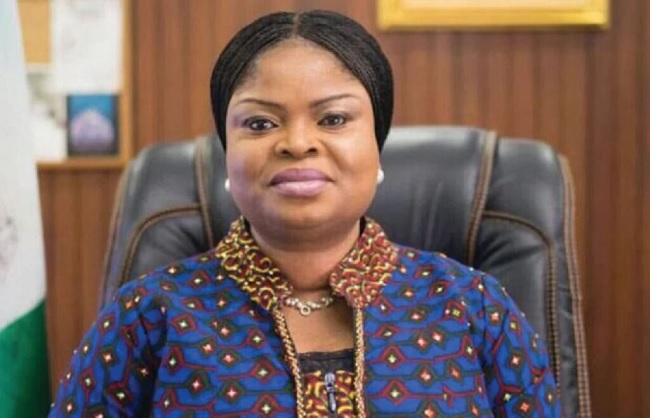Twenty-three states of the federation and the Federal Capital Territory (FCT) have received N24,450,000,000.00 from the conditional grant schemes as inventive to invest more of their resources into areas of national development priorities and the Millennium Development Goals(MDGs)/Sustainable Development Goals MDGs (SDGs).
The fund, disbursed from 2015 to date, was introduced in 2007 with a 50 per cent matching grant from the federal government and 50 per cent from the participating states.
According to the Senior Special Assistant (SSA) to the President on SDGs, Mrs Adejoke Orelope-Adefulire, who disclosed this while appearing at the ministerial media briefing organised by the presidential communications team at the presidential villa, Abuja, on Thursday, the grants were targeted at education, health, water and sanitation projects “and aimed at executing pro-poor projects in a consultative manner with the beneficiaries.”
ALSO READ FROM NIGERIAN TRIBUNE
- Fulanisation, Islamisation Agenda Going On In Nigeria —Obasanjo
- How To Detect Fake Bank Alerts
- 23 states, FCT get N24bn from conditional grant schemes ― SDGs boss
- 23 states, FCT get N24bn from conditional grant schemes ― SDGs boss
Specifically, she revealed that the money was spent on the implementation of 732 water and sanitation facilities; 494 health facilities (new facilities and renovation/rehabilitation); 616 education facilities (new construction, renovation/rehabilitation of block of classrooms; 1,150 women and men were empowered/trained in vocational skills, such as sewing, knitting, detergent & pomade making etc.)
She said there were special intervention projects across the geo-political zones, an initiative, she affirmed, was aimed at strategic investment to fast-track the achievement of the SDGs in Nigeria.
The presidential aide added: “Between 2016 and 2021, a record number of projects have been implemented, aimed at providing essential services to accelerate the achievement of the SDGs, by ensuring no Nigerian is left behind.
Orelope-Adefulire also spoke on some findings from the 2020 voluntarily national review, indicating that from Nigeria’s 2nd Voluntary National Review (VNR) 2020 on SDG-3, while the country faces challenges on health outcomes, such as high rates of maternal mortality, there has been a significant reduction in the under-five mortality rates (from 157 to 132).
She disclosed that Nigeria’s current access to basic drinking water now stands at 64% as according to her, the review emphasised the need for more investment in public health and to ensure the most vulnerable are reached through universal access to basic healthcare services.
She further explained: “On SDG-4, a key challenge confronting the country has to do with Out-of- School-Children, a demographic challenge that relates to an interplay between employment (SDG-8), education (SDG-4), poverty (SDG-1) and the digital economy (SDG-17). With a population of approximately 200 million people, regional disparities are significant.
“With about 10.8 million out-of-school children and more people drifting into poverty, Nigeria’s expenditure on education was just about 8.6 per cent in 2015 and witnessed a steady decline to 8.2, 8.5 and 8.2 per cent in 2016, 2017 and 2018.
“This was largely due to the 2016 economic recession and the decline in global oil prices and COVID-19 pandemic,” she added.
On Goal 2 of Zero Hunger, the presidential aide stated: “Findings from the baseline showed that the prevalence of undernourishment in 2016 for stunting, moderate stunting and severe stunting was 32.9 per cent, 20.4 per cent and 12.5 per cent respectively, while in 2019 the report indicated 32 per cent stunting, and 21.2 and 10.8 per cent for moderate and severe stunting respectively.
Notwithstanding, she said, this was increased from -1.6 per cent in 2016 to 0.82 per cent in 2017 with an annual per capita at -17.31 per cent and was subsequently increased to 1.91 per cent in 2018 and 2.27 per cent in 2019 with its per capita GDP growth of 1.22 per cent in 2019.
According to the SDGs boss, “The Nigerian government has demonstrated strong commitment towards the 2030 Agenda for sustainable development and the SDGs. Institutional Frameworks have been established at the national and sub-national levels to support the effective implementation of the SDGs. Thus, Nigeria is leading in the institutionalisation of the SDGs.
“The SDGs cannot be achieved with stand-alone programmes and projects. They must be carefully integrated into national and sub-national policies and development plans. Currently, we have integrated the SDGs into Nigeria’s national development plan (2021-2025) and we presently supporting 16 States to develop SDG-based development plans.
“It is our hope that all 36 states and the FCT will eventually develop SDG-compliant-development plans. This is our approach to Mainstreaming, Acceleration and Policy Support (MAPS).
“To ‘Leave no one behind, we need the expertise and resources of all – public and private sectors; UN Development System; donor community; academia and the wider Civil Society and concerned citizens.”






